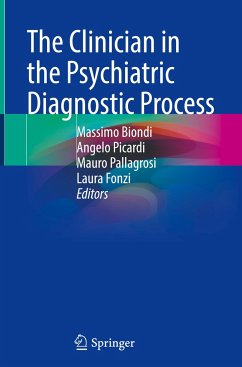
Karl Jaspers' Philosophy and Psychopathology
Versandkostenfrei!
Versandfertig in 6-10 Tagen
129,99 €
inkl. MwSt.

PAYBACK Punkte
65 °P sammeln!
This book is based on a congress evaluating Jaspers' basic psychopathological concepts and their anthropological roots in light of modern research paradigms. It provides a definition of delusion, his concept of "limit situation" so much challenged by trauma research, and his methodological debate. We are approaching the anniversary of Jaspers seminal work General Psychopathology in 1913. The Centre of Psychosocial Medicine of the University with its Psychiatric Hospital where Jaspers wrote this influential volume as a 29 year old clinical assistant hosted a number of international experts fami...
This book is based on a congress evaluating Jaspers' basic psychopathological concepts and their anthropological roots in light of modern research paradigms. It provides a definition of delusion, his concept of "limit situation" so much challenged by trauma research, and his methodological debate. We are approaching the anniversary of Jaspers seminal work General Psychopathology in 1913. The Centre of Psychosocial Medicine of the University with its Psychiatric Hospital where Jaspers wrote this influential volume as a 29 year old clinical assistant hosted a number of international experts familiar with his psychiatric and philosophical work. This fruitful interdisciplinary discussion seems particularly important in light of the renewed interest in Jaspers' work, which will presumably increase towards the anniversary year 2013. This volume is unique in bringing together the knowledge of leading international scholars and combining three dimensions of investigation that are necessary to understand Jaspers in light of contemporary questions: history (section I), methodology (section II) and application (section III).














